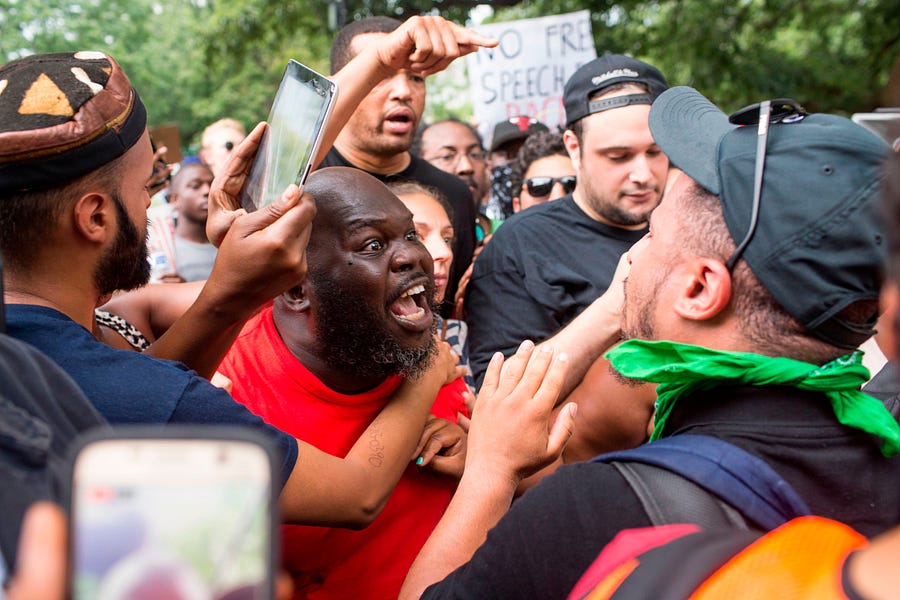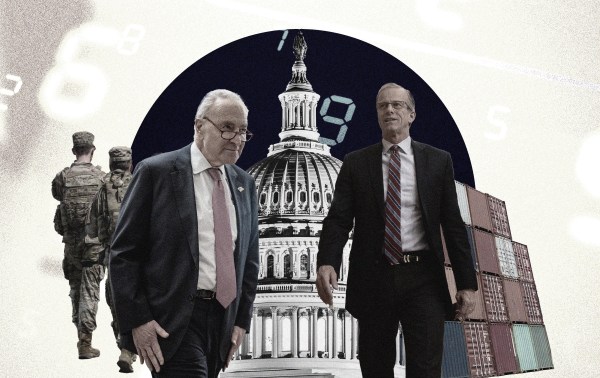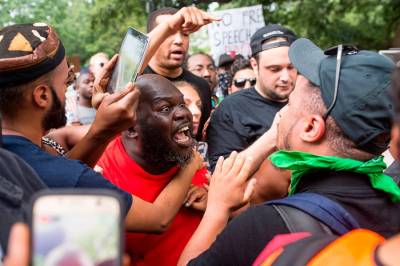I can’t remember the exact moment when I first began to fear for the future of our nation. It certainly wasn’t because of a piece of empirical data. It wasn’t a chart or graph that gave me that vague, sick sense that something wasn’t right. I’m reminded of the opening words of the Lord of the Rings movie trilogy: “The world is changed. I feel it in the water. I feel it in the earth. I smell it in the air. Much that once was, is lost.”
Perhaps it was the time in my life when Nancy and I moved in a few short years between deep-red and deep-blue America, living in both the rural South and urban Northeast. We didn’t merely experience the deep antipathy for faraway political opponents. We also experienced a mutual incomprehension. There was a lack of experience or understanding that in some ways was more disturbing even than the enmity.
With a degree of understanding perhaps there can be reconciliation. With no understanding, even the possibility of reconciliation becomes more remote.
On Friday afternoon Ruth Bader Ginsburg died, and I have never in my adult life seen such a deep shudder and sense of dread pass through the American political class. We knew a polarized and divided nation was about to endure yet another sharp escalation in the culture war, and this escalation could well lead to a cascading series of events that could strain the constitutional and cultural fabric of this nation.
There’s a sad irony here—because in many ways Ginsburg personified the fellowship and mutual respect of eras past. As a conservative, it was easy to disagree with “notorious RBG.” She was a woman of fierce progressive judicial conviction. But it was hard to disrespect her. Her deep friendship with her near-polar ideological opposite, Justice Antonin Scalia, was the stuff of legend. Her life story was inspirational.
A nation needs a healthy left and a healthy right, and in their own ways these unlikely friends represented the best their sides had to offer. I hope and pray that their passings don’t signify the symbolic end of a time when deep friendship could flourish across profound disagreement.
But here we are now, when enmity rules, and all of the short and medium-term incentives are aligned toward greater confrontation. Do Republicans utilize their raw political power to push through a conservative replacement either now or during the lame duck session? If Democrats win Congress and the Senate, do they respond with raw political power of their own, nuke the legislative filibuster, and pack the court? Both courses of action are constitutionally permissible. Neither are culturally and politically prudent. But will the respective bases of the parties tolerate any other result?
And there’s another, critical question: How much more tension and division can this nation take?
As regular readers know, this week I release my new book, Divided We Fall. The central contention is quite simple. “At this moment in history, there is not a single important cultural, political, religious, or social force that is pulling Americans together more than it is pushing us apart.” And therefore “we cannot assume that a continent-sized, multi-ethnic, multi-faith democracy can remain united forever, and it will not remain united if our political class cannot and will not adapt to an increasingly diverse and divided American public.”
Think of the multiple dimensions of our divisions. Yes, all the data indicates that our political enmity is skyrocketing. I don’t want to flood you with charts and graphs, but the headline of a recent Pew Research Center study says it all, “Partisan Antipathy: More Intense, More Personal.” In fact, millions of Americans are now in the grips of what some researchers call “lethal mass partisanship,” where they justify even actual violence against political opponents.
Moreover, we can’t retreat to shared religious values to ameliorate the effects of a toxic political culture. While America may be growing more secular overall, it is not growing more secular at the same rate and in the same places. America’s secular and religious communities are concentrated in like-minded geographic enclaves that track quite closely with red and blue.
We decreasingly enjoy even a common popular culture. In 2016, the New York Times published a series of television ratings maps that showed that red and blue Americans watch very different shows that feature very different themes and mores. This distinction applies to sports as well (it never fails to astonish me that I can travel to certain parts of the country, mention the name “Nick Saban”and get nothing but blank stares), and the only truly universal American sport, NFL football is shot-through with its own political controversies.
All of these trends are exacerbated by our geographic clustering. In 2016 more Americans lived in so-called “landslide counties”—where one presidential candidate wins by at least 20 points—than any time in the modern era. In fact, we’re concentrating in single-party states. A total of 36 states have so-called “trifecta” governments. The same party controls the governor’s mansion and both houses of the legislature.
Only one state in the entire country—Minnesota—has a divided legislature.
The result is that almost 80 percent of the U.S. population lives under one-party rule, with 40.9 percent of Americans living under Republican governments and 36.7 percent living under Democrats. Is it any wonder that now fewer and fewer Americans live like Justices Scalia and Ginsburg, with close friends on the other side of the political aisle?
Finally, clustering has another consequence—extremism. This is the natural human result of gathering people of like mind. In 1999, Cass Sunstein articulated one of the most important cultural realities in American life, the “law of group polarization.” Here’s the definition: “In a striking empirical regularity, deliberation tends to move groups, and the individuals who compose them, toward a more extreme point in the direction indicated by their own predeliberation judgments.”
In plain English that means when like-minded people gather, they tend to grow more extreme. Here’s Sunstein again:
For example, people who are opposed to the minimum wage are likely, after talking to each other, to be still more opposed; people who tend to support gun control are likely, after discussion, to support gun control with considerable enthusiasm; people who believe that global warming is a serious problem are likely, after discussion, to insist on severe measures to prevent global warming.
Now do you see why incentives are so aligned toward greater conflict? If you’re a partisan, the chances are that you not only have outright enmity for your political opponents, you don’t have many (if any) meaningful real-world relationships with those you oppose, and you may even fear that their control of the levers of government will mean the extinction of your liberty and way of life.
So why stand down? Why give an inch? And as you escalate your commitment to no retreat and no compromise, the other side interprets your actions through its own prism—and you confirm their own worst fears.
My book argues that this cultural kindling is increasingly ready to burst into political flame. Not today, not tomorrow, but all the trends are bad. All the trends are dangerous. History teaches us, from 1776 (for good) and 1861 (for evil), that when geographically-concentrated, like-minded Americans believe their culture is under threat, they can and will determine that the existing union shall not last.
What is the solution? I know that readers often want clear, step-by-step guides. Enact this, reform that, and heal the breach. I do believe that necessary policy changes can decrease the political temperature. Respect civil liberties (including your opponents’), increase local autonomy, and de-escalate national politics.
But none of these changes are possible without a critical mass of Americans achieving a change of heart. No, I’m not talking about a sudden, unrealistic outbreak of love and regard. “Love one another” is a desperate hope, achievable only through spiritual reformation and renewal. But can we at least discover moral purpose in pluralism?
In fact, there are two profound spiritual visions—both articulated by the prophet Micah—that can guide both the ends and means of our quest for national unity.
The first is a verse repopularized by Lin-Manuel Miranda, who quoted George Washington quoting the Old Testament. Almost 50 times in his writing, Washington referred to this powerful verse from the book of Micah—“but they shall sit every man under his vine and under his fig tree, and no one shall make them afraid.”
Most memorably, he wrote those words to the Hebrew Congregation of Newport, Rhode Island, to signify that one of the world’s most-persecuted religious minorities would have a home in this new land. Those words signify a basic objective of just rule in a pluralistic nation. Each American can find a home. Each American can find a community. And none shall be afraid.
It’s a pledge that’s often been breached, and the fear that it will be breached again motivates much American division. But can we not declare even to our political opponents—“You will have a home”? Can we not pledge to protect that home by—at the very least—respecting their liberties and autonomy?
The second indispensable spiritual principle of pluralism is also found in the same book. It’s a verse I cite often. Micah 6:8 declares, “He has told you, O man, what is good; and what does the Lord require of you but to do justice, and to love kindness, and to walk humbly with your God?”
These triple, interlocking obligations should guide our interactions in the perilous days to come. The command to “do justice” empowers our sense of righteousness. The command to “love kindness” softens our hearts towards our opponents. And the necessity of “walking humbly” reminds us of our deep limitations in both knowledge and wisdom.
Critically, advancing pluralism does not mean surrendering your convictions. A truly free pluralistic nation is one that protects the autonomy of different cultural and political communities, but creates porous cultural walls between those communities. I can both fiercely defend the liberty and autonomy of my atheist friends while also seeking to bring them to faith in Jesus Christ.
There is a vast difference between a friend who disagrees and an enemy who seeks to dominate. One vision sustains democracy. The other could destroy our republic. As millions of Americans confront both the grief of the loss of a hero while also girding for the divisive cultural battle to come, who will remember the friendship between Antonin Scalia and Ruth Bader Ginsburg? And may we also remember Abraham Lincoln’s famous admonition—ignored to our nation’s great and enduring sorrow—“We must not be enemies. Though passion may have strained, it must not break our bonds of affection.”
One more thing …
My book launches on Tuesday, and on Wednesday night my brilliant Advisory Opinions co-host Sarah Isgur will host a Dispatch members-only discussion about the book.
You can buy the book here. Sadly enough, it feels more timely every day.
If you want to join The Dispatch to be a part of our live conversation, please join today. We’re in the midst of a 30 day free trial for annual memberships. Join now to sample our work.
One last thing …
As darkness creeps over our land I’ve found that I need more songs of light and hope. This song, from Hillsong, has blessed me this week. May it bless you as well:
Photograph by Zach Gibson/AFP/Getty Images.







Please note that we at The Dispatch hold ourselves, our work, and our commenters to a higher standard than other places on the internet. We welcome comments that foster genuine debate or discussion—including comments critical of us or our work—but responses that include ad hominem attacks on fellow Dispatch members or are intended to stoke fear and anger may be moderated.
With your membership, you only have the ability to comment on The Morning Dispatch articles. Consider upgrading to join the conversation everywhere.